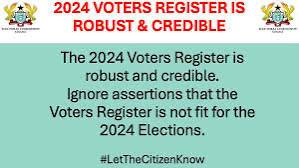Ghana’s Electoral Register: A Credibility Assessment for the 2024 General Elections
As Ghana approaches the 2024 General Elections, the credibility of the electoral register has come under scrutiny. The electoral register serves as the foundation for any democratic election, ensuring that eligible voters can participate in the electoral process. In Ghana, the stakes are high, given the country’s history of competitive and often contentious elections. This article examines the current state of Ghana's electoral register, the challenges it faces, and the implications for the upcoming elections.
#### Historical Context
Ghana has made significant strides in establishing a democratic framework since the return to civilian rule in 1992. However, the electoral register has been a recurring issue, often marred by allegations of inaccuracies, fraud, and disenfranchisement. Previous elections have witnessed disputes over the legitimacy of the register, leading to calls for reforms.
In 2020, the Electoral Commission (EC) undertook a comprehensive registration exercise, resulting in the compilation of a new register. This move aimed to address past concerns and ensure a more accurate representation of eligible voters. As the 2024 elections draw near, the integrity of this register is once again in the spotlight.
#### Current State of the Electoral Register
The Electoral Commission claims that the current register is more accurate than previous ones, with technological advancements employed during the registration process. Biometric data collection has been touted as a method to minimize electoral fraud and ensure that only eligible voters are registered. However, despite these advancements, questions remain regarding the completeness and accuracy of the register.
Critics argue that the 2020 registration process was flawed. They point to reports of individuals being registered without proper verification of eligibility, as well as instances where eligible voters were left off the register. The EC has responded by emphasizing that all registered voters underwent a thorough vetting process, but skepticism persists.
#### Challenges to Credibility
One major challenge to the credibility of the electoral register is the perception of bias within the Electoral Commission. The EC, which is tasked with overseeing the electoral process, has faced allegations of partisanship, particularly in its approach to the register. Opposition parties have often accused the commission of favoring the ruling party, which raises concerns about the impartiality of the register.
Another challenge is the need for continuous voter education. Many citizens remain unaware of the registration process, leading to a significant number of eligible voters not participating in the electoral register. This is particularly evident among young people and first-time voters, who may be disillusioned with the political process. Ensuring that all eligible voters are registered is crucial for a credible electoral register.
Additionally, the issue of duplicate registrations persists. Despite biometric systems designed to eliminate this problem, reports indicate that some individuals may be registered multiple times, either intentionally or due to administrative errors. This undermines the accuracy of the electoral register and fuels further distrust among the electorate.
#### Implications for the 2024 Elections
The credibility of the electoral register has significant implications for the 2024 General Elections. If voters perceive the register as flawed, it could lead to widespread apathy and disenfranchisement. Moreover, disputes over the register could escalate tensions between political parties, potentially undermining the peace that Ghana has enjoyed in recent years.
To enhance the credibility of the electoral register, the Electoral Commission must prioritize transparency. Regular audits of the register, coupled with public disclosures of the registration process, could help build trust among voters. Engaging civil society organizations to monitor the registration process can also provide an independent check on the EC's activities.
Furthermore, the EC should invest in voter education campaigns to ensure that all eligible citizens understand the registration process and their rights. This is particularly important for marginalized communities, which are often the most disenfranchised.
#### Conclusion
As Ghana prepares for the 2024 General Elections, the credibility of the electoral register remains a critical issue. While advancements have been made since previous elections, significant challenges persist that could undermine the electoral process. Addressing these challenges through transparency, education, and community engagement is essential for restoring faith in the electoral system. Ultimately, a credible electoral register is not just about numbers; it is about ensuring that every Ghanaian has a voice in shaping the country's future.


